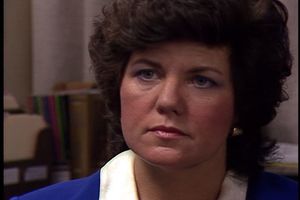Interview with Randall Forsberg, 1988
Item Information
- Title:
- Interview with Randall Forsberg, 1988
- Description:
-
Dr. Randall Forsberg was executive director of the think tank she founded in 1980, the Institute for Defense and Disarmament Studies. In her wide-ranging interview for War and Peace in the Nuclear Age: Visions of War and Peace, Forsberg explores war-and-peace issues, military doctrine, the history and economics of nuclear-weapons development and policy, war-fighting capability and force structure, scenarios and resistance to arms reduction, the history of relations between the superpowers, and their interactions with developing nations. Seven countries, she asserts, account for 99 percent of nuclear weapons. The dispersal of weaponsin the form of the Rapid Deployment Force, tactical weapons, and missiles fitted with multiple warheadsheightens the risk of war in a world moving toward becoming what she calls a global nuclear porcupine. Forsberg asserts that threatening to commit genocide as a way of conducting politics is one of the most deeply immoral and subversive acts of government in the modern world. Moreover, she maintains, a conventional military crisis could easily cross that nuclear threshold. Forsberg advocates the three Rs: reduce, restructure, and restrain conventional forcesthe other side of the military cointhat consume 75 percent of the U.S. military budget. She recalls the moment during arms negotiations between the United States and the Soviet Union when she determined that the arms race is not driven by basic deterrence but by the imperative to gain superiority in threatening to winwithout actually wagingnuclear war. She compares disarmament with abolitionism: most people understood that slavery was evil and didnt know when it would end, but they realized that they had to work until it was eliminated. Forsbergs analysis of the countrys defense dependency and of the shortcomings of the nuclear-freeze movement she spearheaded is laced with her optimism about Soviet Union general secretary Mikhail Gorbachevs reforms. She never abandoned her vision of an educated public that will prevail in demilitarizing international relations to achieve a secure, stable permanent peace.
- Interviewee:
- Forsberg, Randall
- Date:
-
March 3, 1988
- Format:
-
Film/Video
- Location:
- WGBH
- Collection (local):
-
WGBH Open Vault
- Series:
- War and Peace in the Nuclear Age
- Subjects:
-
Soviet Union
Nuclear weapons
International relations
Nuclear disarmament
Gorbachev, Mikhail
Nuclear arms control
Middle East
World War II
Strategic Defense Initiative
Reagan, Ronald
Mutual assured destruction
Institute for Defense and Disarmament Studies (U.S.)
Strategic Arms Limitation Talks II
Antinuclear movement
Cruise missiles
Intercontinental ballistic missiles
Warsaw Treaty Organization
Treaty on the Non-proliferation of Nuclear Weapons (1968)
Disarmament
Schlesinger, James R.
Military-industrial complex
Deterrence (Strategy)
Single Integrated Operational Plan
Nuclear warfare
Warfare, Conventional
Nuclear weapons--Testing
Communism
Carter, Jimmy, 1924-
Kissinger, Henry, 1923-
Soviet Union. Treaties, etc. United States, 1972 May 26 (ABM), 1972 May 26 (ABM)
Soviet Union. Treaties, etc. United States, 1987 December 8
United States. Congress
- Places:
-
Massachusetts > Norfolk (county) > Brookline
Sweden
Afghanistan
China
Poland
Cuba
Lebanon
Cameroon > North (region)
Germany
Iran
- Extent:
- 03:03:32:02
- Link to Item:
- https://openvault.wgbh.org/catalog/V_F4ABF4A779CE4613BDBF7A73CC019CAC
- Terms of Use:
-
Rights status not evaluated.
Contact host institution for more information.
- Publisher:
-
WGBH Educational Foundation
- Identifier:
-
V_F4ABF4A779CE4613BDBF7A73CC019CAC




